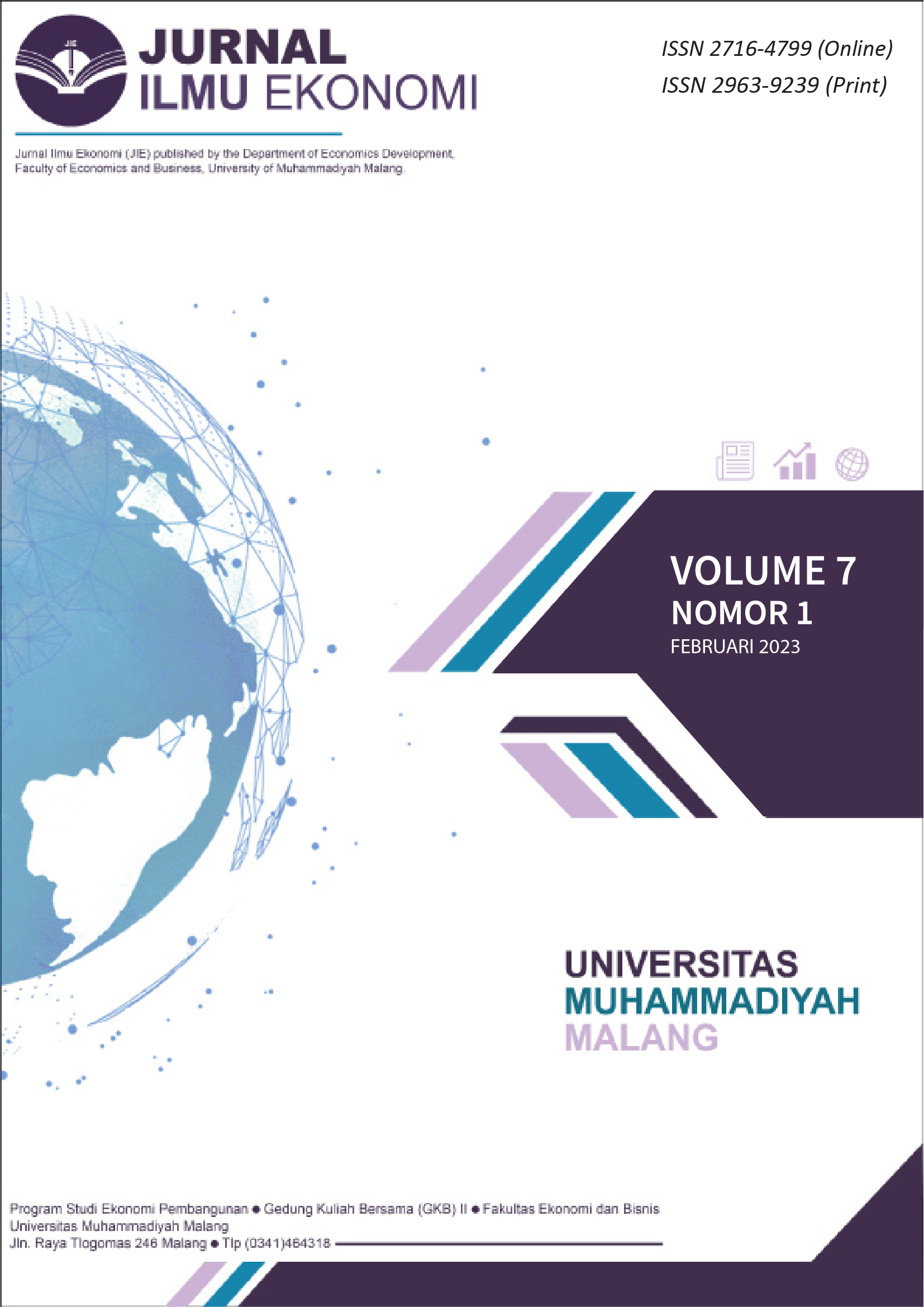Pertumbuhan Ekonomi dan Emisi Karbondioksida di Indonesia
DOI:
https://doi.org/10.22219/jie.v7i01.24639Keywords:
economic growth, investment, net export, co2 emissionsAbstract
Economic growth has a vital role in the running of a country's economy. This research will look at the role of economic growth, investment, and net exports in influencing the development of a country's carbon dioxide emissions—the object of this research in Indonesia. This quantitative research type uses time series data with the Ordinary Least Square (OLS) technique in the multiple linear regression model. The research results on time series data, together with the variables of economic growth, investment, and net exports, show positive and significant results for Indonesia's economic growth from 1990 to 2019
Pertumbuhan ekonomi memiliki peran penting dalam berjalannya roda perekonomian suatu negara. Pada penelitian ini akan melihat bagaimana peran pertumbuhan ekonomi, investasi, dan net ekspor dalam memberi pengaruh pada perkembangan emisi karbon dioksida suatu negara. Negara Indonesia merupakan objek pada penelitian kali ini. Jenis penelitian yang digunakan dalam penelitian adalah kuantitatif dengan menggunakan data time series dengan teknik Ordinary Least Square (OLS) pada model regresi linier berganda. Hasil penelitian pada data time series, secara simultan variabel pertumbuhan ekonomi, investasi, serta net ekspor menunjukkan hasil yang positif serta signifikan pada pertumbuhan ekonomi Indonesia tahun 1990 sampai tahun 2019.
Downloads
References
Ernita, D., Amar, S., & Syofyan, E. (2013). ANALISIS PERTUMBUHAN EKONOMI, INVESTASI, DAN KONSUMSI DI INDONESIA: Vol. I (Issue 02).
Ghosh, S. (2010). Examining carbon emissions economic growth nexus for India: A multivariate cointegration approach. Energy Policy, 38(6), 3008–3014. https://doi.org/10.1016/j.enpol.2010.01.040
Hamidah, C. (n.d.). Keterkaitan antara Inflasi, Pengangguran, dan Pertumbuhan Ekonomi (Pengujian Kurva Philips Untuk Indonesia). Retrieved December 19, 2022, from https://journal.umpo.ac.id/index.php/ekuilibrium
Kasman, A., & Duman, Y. S. (2015). CO2 emissions, economic growth, energy consumption, trade and urbanization in new EU member and candidate countries: A panel data analysis. Economic Modelling, 44, 97–103. https://doi.org/10.1016/j.econmod.2014.10.022
Mercan, M., & Karakaya, E. (2015). Energy Consumption, Economic Growth and Carbon Emission: Dynamic Panel Cointegration Analysis for Selected OECD Countries. Procedia Economics and Finance, 23, 587–592. https://doi.org/10.1016/s2212-5671(15)00572-9
Rahman, M. M., Saidi, K., & Mbarek, M. ben. (2020). Economic growth in South Asia: the role of CO2 emissions, population density and trade openness. Heliyon, 6(5). https://doi.org/10.1016/j.heliyon.2020.e03903
Riat Winanto, A. (2019). INVESTMENT, LABOR AND THEIR EFFECTS ON ECONOMIC GROWTH OF PONOROGO REGENCY. 14, 58–73. https://journal.umpo.ac.id/index.php/ekuilibrium
Shahbaz, M., Hye, Q. M. A., Tiwari, A. K., & Leitão, N. C. (2013). Economic growth, energy consumption, financial development, international trade and CO2 emissions in Indonesia. In Renewable and Sustainable Energy Reviews (Vol. 25, pp. 109–121). https://doi.org/10.1016/j.rser.2013.04.009
Touitou, M. (2021). The Relationship between Economic Growth, Energy Consumption and CO2Emission in the Middle East and North Africa (MENA). Folia Oeconomica Stetinensia, 21(2), 132–147. https://doi.org/10.2478/foli-2021-0020
Zhu, H., Duan, L., Guo, Y., & Yu, K. (2016). The effects of FDI, economic growth and energy consumption on carbon emissions in ASEAN-5: Evidence from panel quantile regression. Economic Modelling, 58, 237–248. https://doi.org/10.1016/j.econmod.2016.05.003
Downloads
Published
How to Cite
Issue
Section
License
Copyright (c) 2023 Biatmoko, I. S. N.

This work is licensed under a Creative Commons Attribution-NonCommercial-ShareAlike 4.0 International License.
Authors who publish with this journal agree to the following terms:
- For all articles published in the JIE (Jurnal Ilmu Ekonomi), copyright is retained by the authors. Authors give permission to the publisher to announce the work with conditions. When the manuscript is accepted for publication, the authors agree to the automatic transfer of non-exclusive publishing rights to the publisher.
- Authors retain copyright and grant the journal right of first publication with the work simultaneously licensed under a Creative Commons Attribution-NonCommercial-ShareAlike 4.0 International License that allows others to share the work with an acknowledgement of the work's authorship and initial publication in this journal.
- Authors are able to enter into separate, additional contractual arrangements for the non-exclusive distribution of the journal's published version of the work (e.g., post it to an institutional repository or publish it in a book), with an acknowledgement of its initial publication in this journal.
- Authors are permitted and encouraged to post their work online (e.g., in institutional repositories or on their website) prior to and during the submission process, as it can lead to productive exchanges, as well as earlier and greater citation of published work (See The Effect of Open Access).
This is an open access article and licensed under a Creative Commons Attribution-NonCommercial-ShareAlike 4.0 International License








